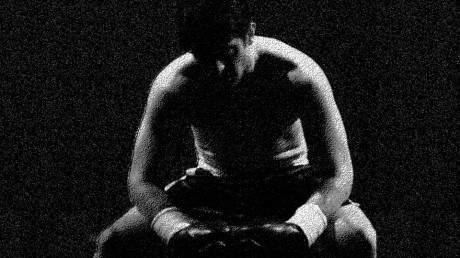Entering the theater, we are greeted, and just this side of visually and audibly—threateningly, or unintentionally?—assaulted, by the sight and sounds of a slim, intense young man doing athletic warm-ups. Hm. Is this the titular bully?
He begins jumping rope, stops, and asks a man in the front row if he wouldn’t mind timing him, with a goal of two minutes. After several effortlessly successful jumps, he trips, and stumbles—and his self-confidence quickly crumbles. He angrily slaps himself and tears begin to form in his eyes, then quickly retreat as his thoughts turn to his childhood and the bullies who for years made him feel worthless and inadequate.
And the reprehensible, incomprehensible indifference, and at times even cruelty, of the adults who witnessed it and did nothing to stop it, or ignored it, or pretended it didn’t happen. Or—in what may have been a twisted effort to “teach” the small child to “fight back” against a group of older, larger kids—blamed him for it.
For this is Lee J. Kaplan’s story. And as you watch, you realize he’s telling it not only to exorcize the ghosts of his consciousness, and of his past, but to exercize the conscience of people, particularly parents, educators and kids, in the here and now.
Kaplan’s a gifted mimic, not only of celebrities—recreating the classic phone games where he and his brother would pretend to be famous people and call unsuspecting neighbors—but of teachers none of us knew but all of us instantly, stomach-curdlingly remember, with his first vicious word or snotty, supercilious look.
Having concerned and loving parents may have offered a respite from the physical, mental and emotional abuse the young Lee suffered, but it could not protect him in a practical sense. Kaplan’s ability to view himself as a child, as well as the bullies who tormented him and the parents who were powerless to protect him, from the perspective of both that child and the successful, self-confident adult he has become, enables us to see these characters as individuals and archetypes, and ourselves and those we once knew mirrored in them.
“I wish I could talk to that kid,” he tells us, “and tell him it’s not him. It’s not his fault. It’s them. Don’t believe a word they say.” The pain is still there, though; as he speaks, it becomes evident that he must relive the agony of those searing injustices and unconscionable, cowardly betrayals each time he recreates them. The audience at the performance I attended was deeply moved, and gave Kaplan the first, and so far only, standing ovation I have seen at this year’s festival. It would have been hard not to.
Running Time: 70 minutes.
Written and performed by Lee J. Kaplan.
Directed by: Padraic Lillis.
Bully plays through July 20, 2013 at Gearbox F-1021 7th Street NW, 3rd Floor, in Washington, DC. For performance information and to purchase tickets, visit the show’s Capital Fringe page.
LINK
2013 Capital Fringe Show Preview: ‘Bully’ by Lee J. Kaplan





